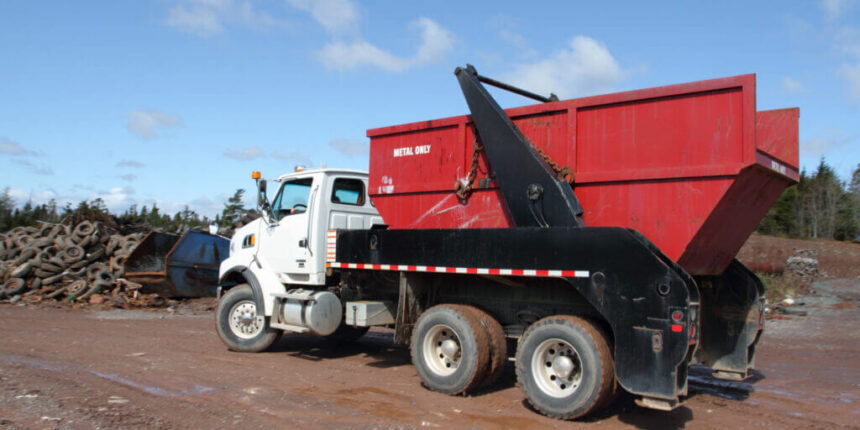Introduction
Every business, from small cafes to large construction companies, generates waste. How that waste is managed can impact not only the environment but also the efficiency and cost-effectiveness of daily operations. Selecting the right type of dumpster is key to keeping your waste management smooth and hassle-free. But with different dumpster options available, such as Front-End Load dumpsters and Roll-Off Dumpsters, how do you decide which is best for your business?
Understanding the strengths and limitations of each type of dumpster is crucial for making an informed decision. In this article, we’ll break down the differences between front-end load and roll-off dumpsters, explore their advantages, and help you choose the right one based on your specific waste disposal needs.
Front-End Load Dumpsters: The Basics
For businesses generating a consistent, moderate amount of waste, front-end load dumpsters are a common solution. These dumpsters are smaller and designed for regular, scheduled pickups, making them ideal for ongoing waste disposal needs.
How They Work
Front-end load dumpsters are often placed behind commercial buildings, restaurants, or apartment complexes, where waste is regularly generated. They are designed with slanted lids and are emptied via trucks that lift the dumpster using forks at the front. This allows for easy and frequent waste collection without the need for much manual handling.
Advantages for Businesses
The primary benefit of front-end load dumpsters is their convenience. These dumpsters are best suited for businesses that generate regular waste, such as offices, retail stores, or restaurants. They are typically smaller than roll-off dumpsters, which means they require less space on-site and can be emptied more frequently.
Additionally, front-end load dumpsters come in a variety of sizes, typically ranging from 2 to 8 cubic yards. Businesses can choose the size that best fits their waste production levels, ensuring that they don’t pay for more capacity than they need. This makes them a cost-effective solution for businesses with predictable waste patterns.
Roll-Off Dumpsters: The Basics
For larger businesses or project-based waste disposal, roll-off dumpsters are often the go-to solution. These dumpsters are larger and designed to handle significant amounts of waste, making them ideal for industries like construction, renovation, and demolition.
How They Work
Roll-off dumpsters are rectangular, open-top containers that are delivered and removed via special trucks. These dumpsters “roll off” the truck when delivered and “roll on” when picked up, which is where they get their name. The open-top design allows workers to easily dispose of bulky waste like concrete, wood, and metal.
Roll-off dumpsters come in larger sizes, typically between 10 and 40 cubic yards, and are meant for temporary use. They are perfect for projects that generate large quantities of debris over a short period of time, such as construction sites or big cleanout jobs.
Advantages for Businesses
One of the biggest advantages of roll-off dumpsters is their capacity. They can hold large volumes of waste, meaning fewer trips to empty the dumpster and less disruption to your operations. This makes roll-off dumpsters ideal for businesses that handle a high volume of waste or materials that are difficult to compact, such as construction debris or bulky items.
Because roll-off dumpsters are typically used on a temporary basis, they offer flexibility for businesses with project-based needs. Whether you’re undertaking a large renovation or managing debris from demolition, these dumpsters provide a versatile and robust solution.
Comparing Front-End Load and Roll-Off Dumpsters
When deciding between front-end load dumpsters and roll-off dumpsters, it’s important to weigh their key differences. Here’s a closer look at how these two types of dumpsters compare in terms of capacity, convenience, and overall suitability for different types of businesses:
1. Capacity
- Front-End Load Dumpsters: With sizes ranging from 2 to 8 cubic yards, front-end load dumpsters are ideal for businesses generating smaller amounts of waste on a regular basis.
- Roll-Off Dumpsters: Available in much larger sizes (10 to 40 cubic yards), roll-off dumpsters are suited for businesses dealing with heavy, bulky materials or large volumes of waste over a short period.
2. Convenience
- Front-End Load Dumpsters: These dumpsters are best for regular waste disposal. They are serviced more frequently and are ideal for locations with limited space.
- Roll-Off Dumpsters: Roll-off dumpsters offer convenience for temporary projects but may require more space and less frequent pickups due to their larger size.
3. Suitability
- Front-End Load Dumpsters: These dumpsters are perfect for small to medium-sized businesses like restaurants, offices, or retail stores, where waste is consistent and non-bulky.
- Roll-Off Dumpsters: Best suited for industries like construction, renovation, and demolition, roll-off dumpsters excel in handling bulky, heavy, and project-based waste.
Additional Factors to Consider
In addition to capacity and convenience, several other factors should influence your decision between a front-end load dumpster and a roll-off dumpster.
1. Type of Waste
The type of waste your business generates should be a primary consideration. If you are dealing with construction materials, concrete, or large bulky items, roll-off dumpsters are the best fit. However, for regular commercial waste like packaging, paper, and food scraps, front-end load dumpsters may be more appropriate.
2. Space Availability
Space is another crucial factor. Roll-off dumpsters require more room due to their size, which may not be feasible for smaller businesses with limited outdoor space. Front-end load dumpsters, being smaller, are easier to fit into tight spaces behind buildings or in designated areas.
3. Frequency of Collection
Consider how often your business needs waste collected. If your waste generation is consistent and frequent, a front-end load dumpster with regular pickups will likely suit your needs. However, if you’re dealing with intermittent, large-scale waste, roll-off dumpsters are designed to handle that volume without needing constant service.
Conclusion
Ultimately, the right choice between a front-end load dumpster and a roll-off dumpster depends on the nature of your business, the type of waste generated, and how much space you have available for waste disposal. Both types of dumpsters have their strengths: front-end load dumpsters offer regular convenience for businesses with predictable waste patterns, while roll-off dumpsters provide the capacity and flexibility needed for large-scale, project-based waste disposal.
By carefully considering your business’s waste management needs, you can select the dumpster that will enhance efficiency and cost-effectiveness while keeping your workspace clean and compliant with regulations. Waste management providers like Delta Waste Solutions can help guide you through this decision, ensuring that your business has the ideal solution for handling its waste efficiently and responsibly.


